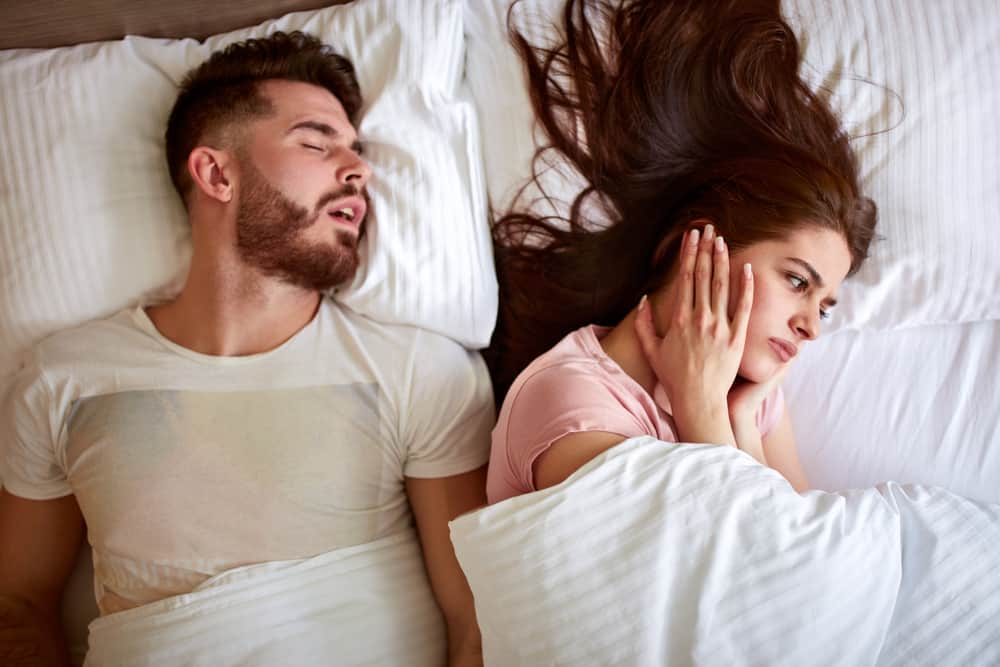
Do you snore when you drink? You’re not alone. Millions of people around the world snore when they drink alcohol. But why does this happen? And more importantly, what can be done to stop it?
Snoring is caused by various reasons, including your sleep position, the type of pillow you use, and even the temperature in your bedroom. But one of the most common causes of snoring is alcohol. Alcohol relaxes the muscles in your throat, which can cause your airway to narrow. This can lead to snoring.
In this article, we will explore the causes of snoring when drinking and what can be done to stop it.
What Is Snoring?

Before we can understand why alcohol causes snoring, it’s important to know what snoring is.
Snoring occurs when the airway is blocked, and the air cannot flow freely. This blockage can be caused by several things, including the tongue falling back into the throat or tissue in the throat vibrating.
When these things happen, the airway becomes narrowed, and airflow is reduced. This reduction in airflow can cause snoring.
Why Do I Snore When I Drink Alcohol?

Now that we know what snoring is, let’s examine why alcohol causes it. As we mentioned, there are two main factors: relaxation of the muscles in your throat and increased blood flow to your nose and throat.
Relaxation Of the Muscles
The relaxation of the muscles in your throat is caused by the alcohol depressing the central nervous system. This condition slows down the signals that tell your muscles to contract. When the muscles in your throat relax, they can collapse and block the airway.
Increased Blood Flow
The second factor, increased blood flow to your nose and throat, is also caused by the alcohol depressing the central nervous system.
This condition slows down the signals that control blood vessels. When these signals are slowed down, the blood vessels dilate and increase blood flow to your nose and throat.
Other Possible Reasons
There are plenty of other reasons people snore when they drink alcohol, including the following:
Allergies
Alcohol can also worsen allergies and cause congestion. Congestion can block the airway and cause snoring.
Dehydration
Alcohol causes dehydration, which can build mucus in the nose and throat. This mucus can block the airway and cause snoring.
Sleep Apnea
Sleep apnea is a condition that causes breathing to stop and start during sleep. It can be made worse by alcohol as it relaxes the muscles in the throat. Reduce the build-up of mucus in the nose and throat.
How Can I Make It Stop?

While there is no cure for snoring, you can do several things to reduce or eliminate it.
1. Elevating Your Head While You Sleep
One simple home remedy for snoring is elevating your head while sleeping. This can be done by using a pillow or sleeping on your side. When you elevate your head, it helps to keep the airway open and reduces the chances of snoring.
2. Reducing Alcohol Consumption
If you are a heavy drinker, reducing your alcohol consumption can also help reduce or eliminate snoring. Cutting back on alcohol will help reduce the relaxation of the muscles in your throat and increase blood flow to your nose and throat.
3. Avoiding Alcohol Before Bedtime
One way to help reduce snoring is to avoid alcohol before bedtime. When you drink alcohol, it relaxes the muscles in your throat and can cause them to collapse and block the airway. This can lead to snoring. So, if you are trying to reduce snoring, avoid drinking alcohol before bedtime.
4. Using a Humidifier in Your Bedroom
A humidifier can also help to reduce snoring. When the air is moist, it is less likely to dry out the throat and nasal passages, leading to snoring. So, if you are trying to reduce your sn, consider using a humidifier in your bedroom.
5. Nasal Strips
There are different types of nasal strips that can help to reduce snoring.
Some of the most popular brands include:
- Nasal Vents
- NasalCicles
- Nasal Strips
These nasal strips work by holding the nostrils open and allowing air to flow freely. This helps to reduce the chances of snoring.
6. Mouthpieces
Another option for treating snoring is to use a mouthpiece. Several different mouthpieces can help to reduce or eliminate snoring.
Some of the most popular brands include:
- SnoreRx
- Zyppah
- Good Morning Snore Solution
These mouthpieces work by holding the tongue in place and preventing it from falling back into the throat. This helps to keep the airway open and reduces the chances of snoring.
If you are struggling with snoring, consider trying one of these mouthpieces. They may help to reduce or eliminate your snoring.
7. Surgery
In some cases, surgery may be necessary to treat snoring. Different surgical procedures can help to reduce or eliminate snoring.
Some of the most common procedures to reduce snoring include:
Uvulopalatopharyngoplasty (UPPP)
Uvulopalatopharyngoplasty (UPPP) is a surgical procedure that can help reduce or eliminate snoring. This surgery removes excess tissue from the palate and throat and helps keep the airway open.
Laser-Assisted Uvulopalatoplasty (LAUP)
Laser-assisted uvulopalatoplasty (LAUP) is a surgical procedure that uses a laser to remove excess tissue from the palate and throat. This helps to keep the airway open and reduces the chances of snoring.
Palatal Implants
Palatal implants are a surgical procedure that uses implants to hold the palate in place and prevent it from falling back into the throat. This helps to keep the airway open and reduces the chances of snoring.
Radiofrequency Ablation (RFA)
Radiofrequency ablation (RFA) is a surgical procedure that uses radio waves to destroy the tissue in the palate and throat. This helps to keep the airway open and reduces the chances of snoring.
If you are struggling with snoring, consider talking to your doctor about these surgical options. They may help to reduce or eliminate your snoring.
Conclusion
If you are struggling with snoring, there are many things that you can do to reduce or eliminate it.
Some of the most effective treatments include: avoiding alcohol before bedtime, using a humidifier in your bedroom, and using a nasal strip or mouthpiece.
If these home remedies don’t work, medical treatments can help, including surgery. Talk to your doctor about these options and find the one that is right for you.









